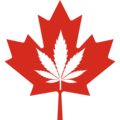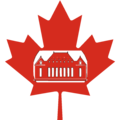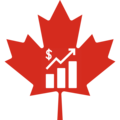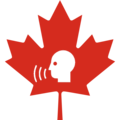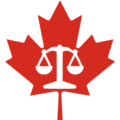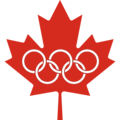Portal:Canada
| Showcase | Contents | Contributing |
Introduction
Canada is a country in North America. Its ten provinces and three territories extend from the Atlantic Ocean to the Pacific Ocean and northward into the Arctic Ocean, making it the world's second-largest country by total area, with the world's longest coastline. Its border with the United States is the world's longest international land border. The country is characterized by a wide range of both meteorologic and geological regions. With a population of just over 41 million people, it has widely varying population densities, with the majority residing in urban areas and large areas of the country being sparsely populated. Canada's capital is Ottawa and its three largest metropolitan areas are Toronto, Montreal, and Vancouver.
A developed country, Canada has a high nominal per capita income globally and its advanced economy ranks among the largest in the world by nominal GDP, relying chiefly upon its abundant natural resources and well-developed international trade networks. Recognized as a middle power, Canada's strong support for multilateralism and internationalism has been closely related to its foreign relations policies of peacekeeping and aid for developing countries. Canada promotes its domestically shared values through participation in multiple international organizations and forums. (Full article...)
Featured article -
The history of post-confederation Canada began on July 1, 1867, when the British North American colonies of Canada, New Brunswick, and Nova Scotia were united to form a single Dominion within the British Empire. Upon Confederation, the United Province of Canada was immediately split into the provinces of Ontario and Quebec. The colonies of Prince Edward Island and British Columbia joined shortly after, and Canada acquired the vast expanse of the continent controlled by the Hudson's Bay Company, which was eventually divided into new territories and provinces. Canada evolved into a fully sovereign state by 1982. (Full article...)
Current events
- April 9, 2025 – Tariffs in the second Trump administration, Executive orders in the second presidency of Donald Trump
- Canada announces a 25% tariff on certain vehicle imports from the U.S. as retaliation against a previous similar measure from the U.S. (BBC News)
- April 3, 2025 – Tariffs in the second Trump administration
- Multinational car manufacturer Stellantis announces it will lay off 900 workers across five of its U.S. factories and will pause production at assembly plants in Canada and Mexico in response to the tariffs. (Reuters)
- April 3, 2025 – Canada convoy protests
- The Ontario Court of Justice in Ontario, Canada, convicts Tamara Lich and Chris Barber, two leaders of the truck driver protest movement against COVID-19 vaccination in Canada, of criminal mischief. (AP)
- April 2, 2025 – Tariffs in the second Trump administration
- China–United States trade war, 2025 United States trade war with Canada and Mexico
- Exceptions include Canada, Cuba, Mexico, North Korea, and Russia. Canada and Mexico had tariffs placed on them in February, while Cuba, North Korea, and Russia are under U.S. sanctions. (BBC News) (France 24) (India Today)
- The United States Senate votes 51–48 on a non-binding resolution to rebuke and reverse tariffs on Canada, with Republicans Rand Paul, Susan Collins, Lisa Murkowski, and Mitch McConnell voting for the resolution. (NPR)
Selected panorama -
National symbol -

Canada Day, formerly known as Dominion Day, is the national day of Canada. A federal statutory holiday, it celebrates the anniversary of Canadian Confederation which occurred on July 1, 1867, with the passing of the British North America Act, 1867, when the three separate colonies of the United Canadas, Nova Scotia, and New Brunswick were united into a single dominion within the British Empire called Canada. (Full article...)
Selected vital article -

Religion in Canada encompasses a wide range of beliefs and customs that historically has been dominated by Christianity. The constitution of Canada refers to 'God', however Canada has no official church and the government is officially committed to religious pluralism. Freedom of religion in Canada is a constitutionally protected right, allowing individuals to assemble and worship without limitation or interference. Rates of religious adherence have steadily decreased since the 1960s. After having once been central and integral to Canadian culture and daily life, Canada has become a post-Christian state. Although the majority of Canadians consider religion to be unimportant in their daily lives, they still believe in God. The practice of religion is generally considered a private matter throughout society and the state. (Full article...)
Selected picture -
Featured biography -

Charles Stewart PC (August 26, 1868 – December 6, 1946) was a Canadian politician who served as the third premier of Alberta from 1917 until 1921. Born in Strabane, Ontario, in then Wentworth County (now part of Hamilton), Stewart was a farmer who moved west to Alberta after his farm was destroyed by a storm. There he became active in politics and was elected to the Legislative Assembly of Alberta in the 1909 election. He served as Minister of Public Works and Minister of Municipal Affairs—the first person to hold the latter position in Alberta—in the government of Arthur Sifton. When Sifton left provincial politics in 1917 to join the federal cabinet, Stewart was named his replacement. (Full article...)
Did you know -

- ... that Jonathan Beaulieu-Richard retired from the Canadian Football League to become a pharmacist?
- ... that Canadian professional ice hockey player Larry Jeffrey had eleven knee surgeries in a span of nine years?
- ... that Gil Kim played professional baseball in the Netherlands, China, Australia, Spain, and Venezuela, scouted in Mexico and the Dominican Republic, and coaches in Canada?
- ... that celebrities who were interviewed in The Canadian Conspiracy were paid US$500?
- ... that Lyle Bauer continued to attend Canadian Football League executive meetings despite being unable to speak due to his treatment for stage four throat cancer?
- ... that in 2019, the Canadian government's Translation Bureau began providing translation services in Dene, East Cree, Plains Cree, and Mohawk?
- ... that Sheila Egoff, Canada's first professor of children's literature, returned to her library work immediately after retirement?
Featured list -
The Vanier Cup (French: Coupe Vanier) is the trophy awarded annually to the champion Canadian football team in U Sports, the governing body for university sports in Canada. The U Sports football champion is determined in a one-game playoff (the Vanier Cup game), played by the winners of the Uteck Bowl and the Mitchell Bowl. In turn, the participating teams are determined by the winners of four bowl games: the Loney Bowl (AUS), Hardy Cup (Canada West), Dunsmore Cup (RSEQ), and Yates Cup (OUA). The Vanier Cup game is played at a neutral site that changes every year; the hosting university is determined months or years in advance. (Full article...)
Main articles
Associated Wikimedia
The following Wikimedia Foundation sister projects provide more on this subject:
-
Commons
Free media repository -
Wikibooks
Free textbooks and manuals -
Wikidata
Free knowledge base -
Wikinews
Free-content news -
Wikiquote
Collection of quotations -
Wikisource
Free-content library -
Wikiversity
Free learning tools -
Wikivoyage
Free travel guide -
Wiktionary
Dictionary and thesaurus





